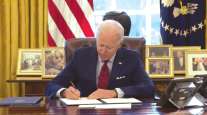Oil Lobby Backs Carbon Fee as Substitute for Regulation

[Stay on top of transportation news: Get TTNews in your inbox.]
The American Petroleum Institute board voted March 25 to endorse putting a tax or other price on carbon dioxide emissions, a shift for the oil industry that could influence the Biden administration’s plans for a governmentwide assault on global warming.
The largest U.S. oil industry lobbying group cast its support for a so-called carbon price as part of a broader plan for combating climate change, including efforts to standardize reporting of sustainability efforts and propel emissions-reducing technologies. But API support for the carbon price hinges on the policy being applied economywide and replacing existing regulations on greenhouse gases — a trade-off seen as key to luring support from Republicans on Capitol Hill.
The blueprint reflects the industry’s attempt to reconcile the clamor for zero-emission energy sources with its core business selling fossil fuels. The industry needs to pare emissions while providing more energy to the world, said API President Mike Sommers.

Even before the pandemic, DHL's Larry S. Onge and Jim Monkmeyer set up strategies and implemented technology in order to respond to disruptions. Now, they know exactly how to get the vaccine from point A to point B — and, better, how to do it at a global scale. Hear a snippet, above, and get the full program by going to RoadSigns.TTNews.com.
“We think that a carbon pricing policy that is market-based, transparent and economywide gives us the best opportunity to achieve that,” Sommers said. “What we’re not going to support is just putting a price on carbon or carbon tax or whatever it is on top of the existing regulatory regime.”
A carbon price could take the form of a tax or cap-and-trade program, with explicit costs for emitting carbon dioxide that deter the use of oil, natural gas and coal while encouraging cleaner alternatives.
The idea of a carbon tax has long enjoyed support from economists — including President Joe Biden’s Treasury secretary, Janet Yellen — because it would ensure the costs of climate change are embedded in the price of carbon-intensive products, such as gasoline and cement. Some oil companies, from Exxon Mobil Corp. to Royal Dutch Shell Plc, had already thrown lobbying dollars behind a plan to tax emissions and distribute the revenue back to consumers.
The idea has gained traction with business groups and moderate Republicans in Washington, as the Biden administration readies a new emissions-cutting pledge and regulations cracking down on greenhouse gases from oil wells, automobiles and power plants.
Another element of the API plan aligns with Biden administration goals: a recommendation to “avoid carbon leakage,” where climate policies put domestic energy producers and manufacturers at a competitive disadvantage, encouraging operations to shift to regions with less-stringent rules. The Office of the U.S. Trade Representative said earlier this month it would consider a carbon border adjustment to encourage climate action globally while protecting domestic manufacturing.
The API, which represents large integrated oil companies such as Exxon and Chevron Corp. as well as independent producers and refiners, is vowing to put lobbying muscle behind the effort. Sommers did not specify what resources would be devoted to the push but said the group was already advocating the approach with Republican and Democratic lawmakers. Oil company executives argued in favor of a carbon price in a meeting March 22 with National Climate Adviser Gina McCarthy.
Supporters say a carbon tax would help propel emissions reductions in difficult-to-decarbonize businesses such as cement and steel making. A price on carbon could create demand and revenue for technologies that are too costly to develop and deploy today.
“We all understand the future is going to include policies to address climate change, but what the policies will be is unknown and can swing quite a bit from administration to administration,” said Greg Bertelsen, head of the Climate Leadership Council pushing a carbon fee-and-dividend plan. “What a carbon price does is it puts everyone on a level playing field and says ‘here are the rules of the game, and now you in the marketplace, go compete.’ ”
Some environmentalists argue a baseline of federal regulations is needed to guarantee emissions reductions and the rules shouldn’t be traded away for a carbon price. Many congressional Democrats also favor a nationwide standard mandating clean energy instead of a carbon tax that could prolong demand for natural gas.
Want more news? Listen to today's daily briefing below or go here for more info:




